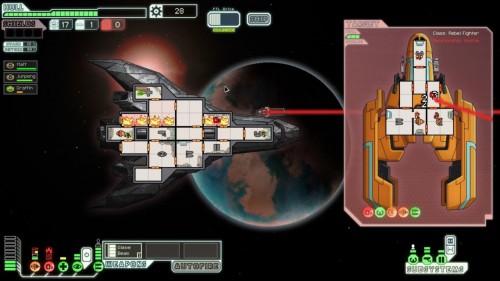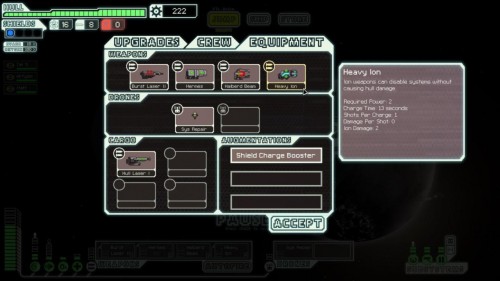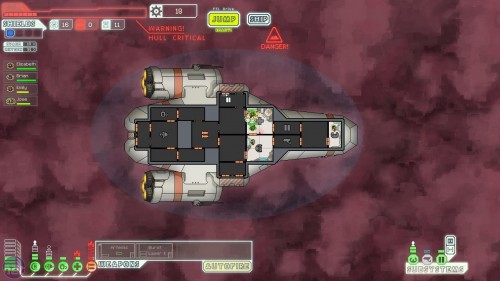FTL – The Verdict
You can tell a lot about a civilisation from the quality of their starship amenities. Take the Federation for example – holodecks, lounges and gyms are standard on pretty much all of their vessels. The corridors are well lit and spacious, demonstrating a culture that truly cares about their citizens. The Klingons on the other hand – cramped, dark ships without luxuries or non-essentials. You’d be lucky to find even so much as a reclining chair on a Bird of Prey.
FTL’s starships, in comparison, lack dining facilities, sleeping accommodation or even toilets. If that doesn’t tell you something about the life expectancy of your average crew-member, I don’t know what does.
For many people, FTL represents the beginning of a new era. It’s one of the first titles to complete the Kickstarter process from start to finish, leaving a great many people wondering if their gamble was worth it. The short answer is yes. The longer answer is most definitely yes. Those of you who’ve been living in space these past few months, however, might be wanting a little more information.

The plot of FTL is very simple. Having come into the possession of some rather important information regarding the Rebel fleet, your starship is tasked with returning home to deliver it. With not enough weaponry or fuel to make the complete journey, you’ll need more than a little luck to get you there. Between you and home lie eight sectors of unexplored, randomly generated and generally hostile space. Oh, and did I mention the entire rebel fleet is hot on your tail and desperate to see you burn? Pretty sure I did.
FTL is not a game about piloting skills, but decision making. As the player, you are not manually dogfighting your way across the galaxy but instead you take the role of the commander. You’re the Picard to FTL’s Enterprise, desperately calling for power reallocations and last moment plans to save your ship. Cut power to the sickbay to reinforce the shields, or take power from life-support in a last ditch attempt to charge your weapons? Those decisions lie with you.
Battles are what FTL is really all about. When you arrive in a new sector, quite often you’ll find a vessel there waiting for you. Whether down to a general dislike of your race, or your poor skills as a diplomat, you can then find yourself then embroiled in an exchange of fire.

Once in combat, your decisions mean life and death, often within the space of several seconds. In a previous playthrough, I’d beamed a boarding team onto the enemy ship. As their health reduced, I was about to beam them back when I realised our transporter room had been taken offline. Ordering a crewman to repair it would mean taking them from another vital system and I didn’t have the hands to spare. As a result, I jumped out of the system, leaving my boarders to a dismal fate on the enemy ship.
FTL allows you to pause as often as you like, adjusting orders and giving you time to think things through, but that doesn’t make things any less hectic or tense. When there’s a missile incoming and your shields are down, your corridors are on fire and there’s a giant preying mantis eating your crew, giving you all the time in the world to think isn’t going to make things any easier.
Even outside of combat, there’s just as much to think about. Do you spend your scrap on upgrading your engines or shields? Do you instead search for a store to spend it on new equipment? Neglecting even innocuous equipment like upgrading your doors can ultimately result in your ship listing in space, her dying crew cursing a lack of yale locks.

Death in FTL is permanent, but the randomisation of the galaxy and the possibility of ship unlocks encourages replayability. Each vessel has different advantages and limitations, each requiring their own strategies to survive the perils of deep space. There’s clearly lots to do, but despite this, I’m not entirely convinced that it has enough replayability. After twenty or so hours of playing, I suspect I’ve seen most of the events by now, I’ve plenty of strategies, and I tend to be repeating the same actions unless things start to go horribly wrong.
I’ve played FTL for long enough now that I think I’ve seen it all. I know the ship types and the weapons in play, but there’s one thing I can’t count on, and that’s FTL being predictable. When combat starts and the lasers start flying, your fate lies in the hands of the gods.
I have absolutely no hesitation in recommending FTL to anyone. It’s a truly unique roguelike, providing a real sense of commanding a starship. It’s fundamentally a game about making decisions, both short and long-term, then forcing you to weigh up the risks and consequences of any given action. For all the Kirks, Picards and Janeways out there, this one’s for you.
Verdict: Head Shot
Platforms Available – PC
Platform Reviewed – PC
For more information on our scoring policy please read this post